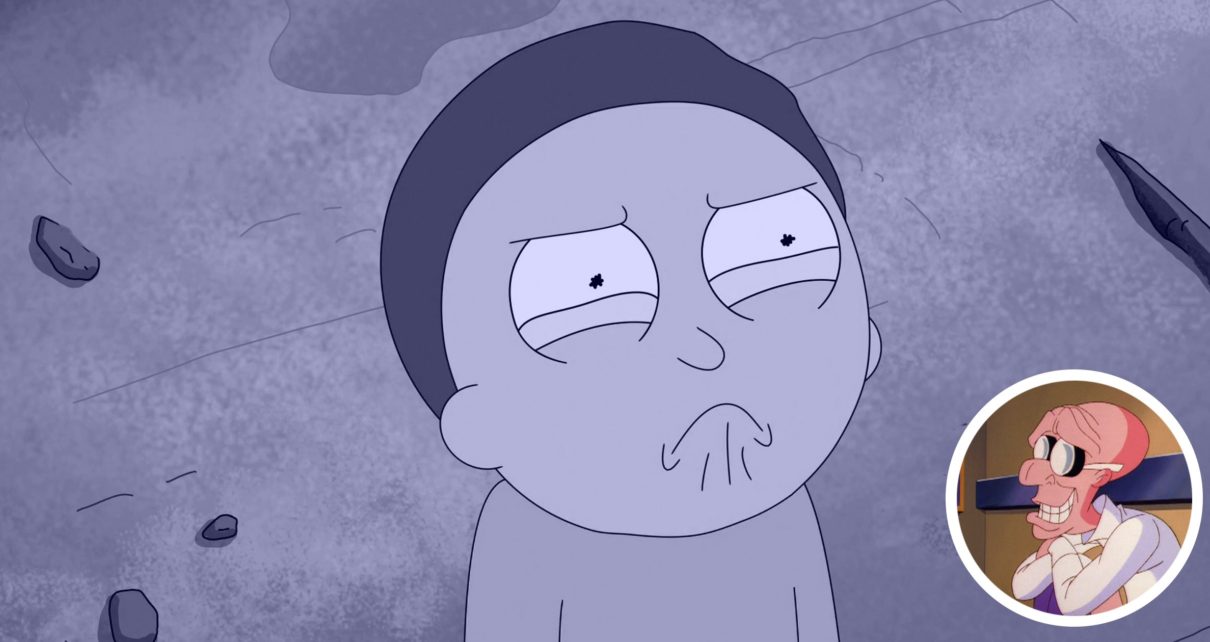Welcome to Ask Scratchy, a monthly column in which the Animaniacs’ top psychiatric mind answers the tough questions for cartoon characters from the four corners of the Earth. To submit a question, email the good doctor at askscratchansniff@gmail.com.
Dear Dr. Scratchansniff,
Whoo, boy, Doc. This is a tough one, lemme tell ya. So my Grandpa Rick — he’s, like, an intergalactic criminal super-scientist? And he’s drunk all the time, and I think he hates himself, and I think he hates me, and he definitely hates my dad. And he drags me around the galaxy all the time in search of a bunch of crazy stuff, and sometimes we go into other dimensions, and I never feel like I have any control, you know? Half the stuff I see, it’s like — I’m not even sure anyone’s ever seen half of the stuff I see on, like, an afternoon, you know? Like one time, I saw my grandpa’s best friend, Birdperson — I think he’s part bird and, like, part person — get killed by his wife, who was supposed to be my sister’s high school friend but was actually an undercover intergalactic agent, at his own wedding! And another time I buried my own dead body from another dimension! All this stuff really gets to ya, ya know? Like, what do you even do with that!? What a life.
Sincerely,
Wubba Lubba Dub Drubbed
Guten Tag Wubba Lubba Dub Drubbed,
Chaotic intergalactic travel? Constantly drunk family member? Witnessing a murder? Confronting your mortality head-on? Hoo boy, you have seen some things! I’d like to break this down piece by piece, or as we in the therapy community call it, “partialize” your problems.
First, I’m concerned about your grandfather, and it sounds like you are too. If he indeed is drunk all of the time, it’s likely that he has a substance use disorder (or SUD). In essence, a person can be diagnosed with an SUD when his use of drugs or alcohol significantly interferes with his life (i.e., prevents him from working, getting along with friends and family) or causes significant personal distress. Fortunately, there are plenty of resources out there for people dealing with SUDs. Many hospitals have detoxification and rehabilitation, as well as outpatient substance use treatment programs. You can also call your grandfather’s insurance company (if being an intergalactic criminal super-scientist comes with a health plan) to see if there are any outpatient substance use clinics or private therapists that could help him. If not, Alcoholics Anonymous (AA) is great resource for individuals looking to talk through their challenges and meet others with similar problems. Go to AA’s “Find Local AA” page to see where and when your local meetings are held.
Unfortunately, you can’t force someone to get help if they don’t want it. Your best bet here is to share your concerns with your grandfather. You may also want to use the DEAR MAN communication skills I discussed last month to talk to your grandfather about how being toted around as his space-travel companion makes you feel (“While I really like going on adventures through time and space with you, I don’t like that I have no say about when or where we travel. It makes me feel unstable and out of control.”) If you can, it’s best to have this conversation when your grandpa is sober, or ideally, after he’s made some headway in his treatment. As I’m sure you’re well aware, drunk people tend to have impaired judgement and disinhibited expressions of emotions, both of which get in the way of having honest, rational, and empathetic conversations.
Drunk grandfather and unpredictable space travel aside, I’m most concerned for your emotional wellness and safety. I shudder thinking of confronting a live alternate-dimension version of myself; thinking about burying my clone’s body leaves me convulsing with anxiety and existential despair. No human should have to witness such unnatural horror. No human should have to witness death of a loved one either, but sadly, this kind of trauma happens more regularly than most people like to admit. People tend to react in one of three ways when faced with a traumatic event or situation (i.e., something that threatens the safety or integrity of themselves or others): we fight, we flee, or we freeze. While these reactions are helpful in the moment of the trauma — allowing us to make sure we’re either physically or emotionally safe — they tend to persist years after the trauma has passed, making us react to non-traumatic situations as if we were in grave danger. In fact, trauma can fundamentally change the way our brains are wired, making it hard for people break free of their maladaptive behavioral cycles.
Ask yourself these questions: Do you find yourself avoiding people, places, or things that remind you these traumas (i.e., burying your own dead body, seeing Birdperson killed)? Do you avoid thinking about them? Are you more easily startled than usual? Has the way you think about yourself and the world fundamentally changed? Do you space out a lot, or feel emotionally numb? If you answer yes to any of them, go get help! In fact, I’d suggest getting help even if you answer no to each of these questions. It’s important to invest as much care into your mental health as your physical health; even if you’re not suffering now, therapy can help you become more resilient and emotionally flexible.
There are many ways you can find a therapist. Before you do anything, call your insurance company and make sure you have mental health coverage. You can also ask your insurance company for a list of in-network providers. Websites like Psychology Today can also point you in the direction of a therapist who accepts your insurance. Although it’s harder to find an affordable therapist when you don’t have insurance, there are private therapists and clinics (private, non-profit, and hospital) that offer low-cost services or sliding-scale fees. Training institutes, where new or student therapists go to learn specific types of therapeutic techniques, are also a great resource for affordable mental healthcare.
If you can do all of this you will be able to help your grandpa and help yourself, and das, Wubba Lubba Dub Drubbed, ist gut.
Morty’s Ask Scratchy question was submitted by John Maher.
Ask Scratchy is for educational and entertainment purposes only. Although the character Dr. Scratchansniff is modeled after two psychoanalytic luminaries, Sigmund Freud and Otto Kernberg, this column is not intended to be a substitute for professional medical advice, diagnosis, or treatment. Always seek the advice of your physician, mental health professional, or other qualified health provider with any questions or concerns you may have regarding a medical condition.
Thanks for reading The Dot and Line, where we talk about animation of all kinds. Don’t forget to follow us on Twitter and sign up for our newsletter.





